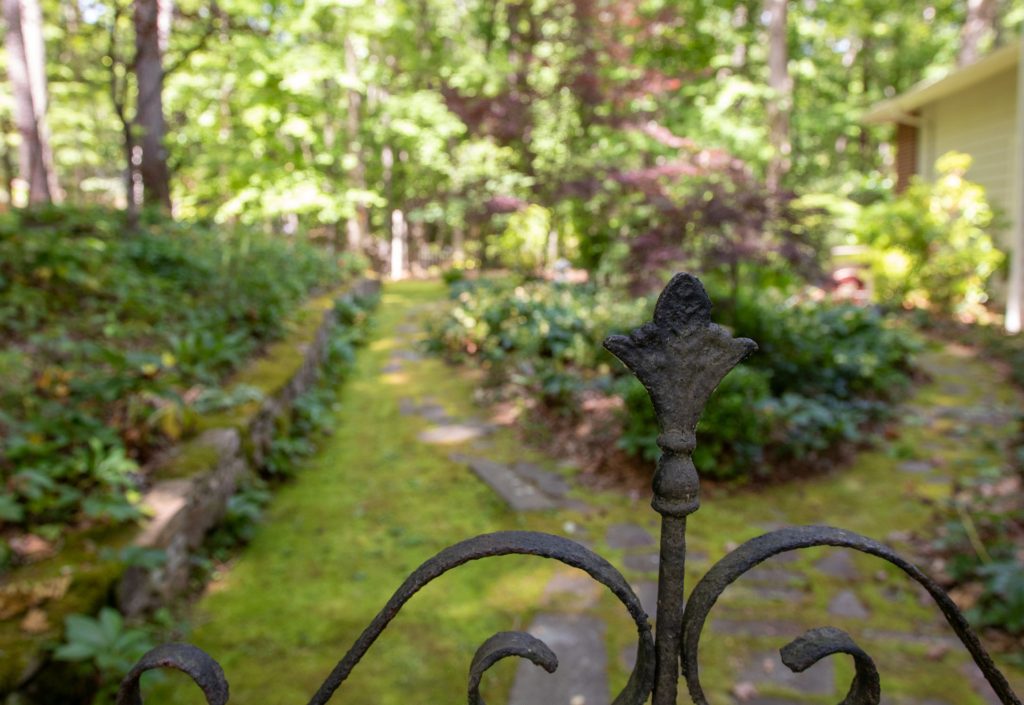By Jane Brown, Chapel Hill Garden Club
Only a few miles out of Carrboro, a four-acre woodland garden beckons visitors to learn more about the seven layers of a forest garden. Katie Loovis’ garden is one of the five private gardens and the North Carolina Botanical Garden (NCBG) featured on this year’s Chapel Hill Garden Club Tour held April 27 (10 a.m. to 4 p.m.) and April 28 (11 a.m. to 4 p.m.).
The perimeter path around the Loovis property was laid out following the contour of the land along the base of the hill on which the 1980s house sits. About 20 years ago, the second homeowner, inspired by NC state parks, established a more extensive network of moss-covered walking trails, low stone walls, and native plantings.
Katie Loovis, a Master Gardener, now has begun to establish a small-scale permaculture ecosystem, including a food forest, compost system, seed starting station, and a micro greenhouse, as well as nearly a dozen outdoor sitting areas she calls “garden rooms.”
Visitors walking along the gravel trails, across the wooden bridges, and through a blooming Buckeye tunnel will feel the sun on their skin as it peeks through the tall canopy of oaks, poplars, and pines (the highest of a forest’s seven layers). If moving quietly or sitting in one of the swings or Adirondack chairs, they may have the mindfulness experience the Japanese call Shinrin-Yoku (forest bathing).
Loovis hopes visitors also will learn more about shade and deer resistant plants, alternatives to turf grass, and the benefits of leaf litter as a ground cover. Loovis said, “This forest garden demonstrates the beauty and benefits of a lower maintenance, natural, and biodiverse landscape design.”
Loovis, who calls herself a “plant nerd,” has also begun an 1,800 square foot “food forest” that she describes as “a permaculture strategy for growing food that works with nature rather than against it.” She said, if left alone, this region would be a temperate deciduous forest. Actively cultivating edible perennials throughout the many layers of the forest is an alternative to conventional garden/orchard agriculture and results in a well-balanced, edible ecosystem with lasting, low-maintenance harvests.
Behind a seven-foot deer fence, Loovis is cultivating seven layers of edible plants, such as these: (#1) Canopy layer – red and white oak; (#2) Sub-canopy – apple, pawpaw; (#3) Shrubs – raspberry, bush cherry; (#4) Herbaceous – sorrel, Egyptian walking onion; (#5) Groundcover – strawberry, wintergreen; (#6) Root – Jerusalem artichoke, mushrooms; (#7) Climbers/vines — Muscadine grapes.
Tickets for access to the Loovis garden as well as four other private gardens and the NCBG are $30 in advance and available online at chgc2024gardentour.eventbrite.com. Eventbrite vouchers will be redeemed on Tour days at the NCBG for a booklet that includes garden descriptions and a map. In-person ticket sales (cash or check only) begin April 1 at the NCBG Gift Shop, Southern States (Carrboro), and Victoria Park Florist.
Tickets on Tour days are $40 and available in the NCBG Education Center breezeway (9 a.m.–3 p.m. on April 27 and 10 a.m.–3 p.m. on April 28). Youth 16 and under are free with a ticketed adult. Rain or shine, the tour will go on.
For more information about the Tour and the Chapel Hill Garden Club, visit chapelhillgardenclub.net. BuildSense, a local high-performance design + build company, is the presenting sponsor of the tour.
Photo caption:
During the April 27–28 Chapel Hill Garden Club tour, visitors can explore the Loovis woodland preserve west of town. The four-acre property includes a permaculture ecosystem producing edibles and medicinals. Photo by Daphne McLeod.
